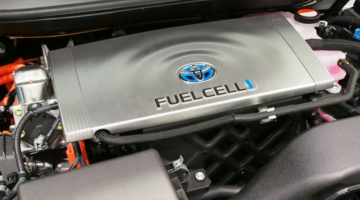
Why should we talk more about Hydrogen & Fuel Cell Technology?
You may have heard of hydrogen powered cars or fuel cell CHP boilers, they are relatively new products, but how exactly do they work?
In this blog we put the hydrogen fuel cell that powers them under the microscope. If we could somehow refine this and the associated technology underpinning it, and combine this with the right hydrogen fuel, we could potentially go a long way towards meeting our energy demands over the next hundred years. In doing so, we could reduce our dependence on petrochemicals.
A bit more about Hydrogen Fuel first
What is Hydrogen?
Hydrogen is the most plentiful gas found in our Universe. In fact it makes up about 75% of the Universe’s bionic mass and is famously symbolised as H2, because it exists as a molecule formed of two hydrogen atoms.
Hydrogen has the most energy potential out of all the fuels that are out there. Unfortunately on Earth it is not found as a standalone element, but tends to be combined with nitrogen, oxygen and carbon atoms to form more complex compounds. The most obvious resource where hydrogen can be extracted from is Water or H2O. But is also found in fuels such as methane, biogas, biomass energy and other traditional oil based fuels.
How can Hydrogen be extracted?
In order to be able to use hydrogen as a fuel, you need to be able to separate it from the source compounds such as water or traditional fuels. This process requires electrical energy, and the Hydrogen produced tends to be in gaseous form which then needs to be liquified. In an ideal situation the whole generation process is carried out using renewable energy; for example you can use commercial wind farms, solar power plants or a hydroelectric power plant to produce the hydrogen fuel.
Hydrogen can also be produced as a by-product by using a cutting edge technology known as ocean thermal energy conversion or OTEC for short.
How safe is Hydrogen Fuel?
Hydrogen gas is explosively flammable; you may recall from history the Hindenburg disaster in 1937, where the hydrogen filled airship exploded mid air before it landed into New York.
As such, burning hydrogen gas in air is considered too dangerous a process to do on a large scale for electricity production.
Nowdays, hydrogen is used in fuel cells, where it undergoes a chemical reaction instead of combustion. This still means that large quantities of cooled liquid hydrogen need to get transported from where the gas is produced to where it is needed, but as their is no combustion involved, evidence shows that when proper procedures are followed, hydrogen fuel is no more dangerous than existing fossil fuels.
Now Take the Hydrogen to Power Fuel Cells
What are Fuel Cells?
To put it simply, fuel cells work like batteries, which have an electrode and cathode and an electrolyte between them, however the great thing about them is that they don’t require charging!
Unlike the combustion process, which has been the standard way of generating energy for hundreds of years, the fuel cells are all about creating energy by passing inputs through an electro chemical process, using fuel and air as part of the reaction. They are virtually zero carbon emitting, but at the same time produce pure water as one of the by-products.
How do Fuel Cells Work?
The hydrogen fuel acts as a catalyst at the cathode, creating a positively charged ion and an electrically charged electron. The proton then passes through the electrolyte while the charged electron passes through a circuit creating an electrical current (which is what is used to power hydrogen cars). At the same time oxygen in the air passes through the cathode and reacts with the ion and the electron to produce heat (which is used to produce hot water in CHP boilers) and water. That’s the process in a nutshell!
What Are Some Advantages of Fuels Cells vs. Conventional Combusting Fuels
- The process is quieter as there is no moving parts
- The process is more efficient – CHP cogeneration can generate efficiencies of fuel to energy of 90% and above. Current grid power based on fossil fuel base load operates with 30% efficiency
- The process is clean – by-products produced is water if hydrogen fuel is used
- Complimentary to other renewable resources such as commercial solar power plants or wind farms, where fuel cells can be used to provide the base load power
- Energy security – the electro chemical process can take hydrogen fuel or other hydrocarbons as well as various biofuels
Where are we with Fuel Cell Technology
Fuel Cell Technology Development in the UK
In the UK we are still having arguments about Gas vs. Nuclear Fission as being the base energy load for the next few decades. We are slowly bringing renewable technologies into the mix but at quite a slow rate (only 10% of the total energy supplied at the moment is from renewable resources). For example, onshore wind price per kWh generated has come down, however this has been offset as future development is being resisted by some local communities. Offshore wind on the other hand is subsidised but the kWh cost generated is still too high and this energy resource is intermittent. In addition we are still many years away from making marine energy (tidal energy and wave energy) pay off and seemingly even further away from increasing the scale of fuel cell technology to be even seen as a viable base load method of energy production.
However the UK can lead this area of research in other aspects, for example the process of commercialising the production of hydrogen fuel. Once hydrogen can be produced cheaply and without hindering the supply of fresh water supply, fuel cell technology solutions will take off!
Earlier we mentioned OTEC. UK companies such as BG and BP, the current leaders in gas, oil engineering and transportation of petrochemicals can therefore really leverage from this technology to produce the hydrogen fuel that we need – effectively using OTEC and upgrading unused oil rigs off the coast of the tropical oceans. Jobs and expertise can be maintained in this sector, which helps keep engineering alive in this country! Oil companies can use existing transportation infrastructure, and instead of transporting fossil fuels, could transport hydrogen fuel all round the world.
A bit more CHP Boilers, Hydrogen Fuel Cell Vehicles & Other Uses
As already mentioned fuel cell technology is currently being developed on a small scale for household appliances like CHP boilers. This will eventually replace the current CHP Boilers that are based on the Free Piston Sterling Engines. Companies such as Baxi and Ceres Power are looking to develop this technology so that it can be brought into the home, but it currently looks like this could be feasible in the second part of this decade.
The technology can also be applied to hydrogen fuel cell vehicles. There are some excellent prototypes out there such as this one produced by Toyota. Closer to home we have Riversimple for example, vying to get their product out in the marketplace.
It is not just boilers and cars though, there are many other uses for fuel cells. Some of the noted ones include large fuel cell systems to power buildings, smaller systems for telecommunication equipment, uses for the military and use as replacement for battery charge systems in the home. In addition a big area of use is to handle applications such as primary power or auxiliary power units in a variety of transportation vehicles such as cars, buses and trucks.
Things are moving slowly with regards to hydrogen fuel cells, but they are moving in the right direction.












Because pure hydrogen does not occur naturally, it takes energy to manufacture it. There are different ways to manufacture it, such as, electrolysis and steam-methane reforming process. In electrolysis, electricity is run through water to separate the hydrogen and oxygen atoms. This method can be used by using wind, solar, geothermal, hydro, fossil fuels, biomass, and many other resources..;,:
Catch ya later
I tried to run a motorcycle without any supply of petrol. It worked wonderfully well but was getting heated up due non supply of lubrication oil to moving parts. Similarly I used it to run a small car engine without any fuel supply. The electric current in both cases was supplied by the dynamo originally fitted to the vehicles. I can’t understand why the car manufacturers are not able to bring out cars working on hydrogen gas produced by electrolysis principle. I would very much appreciate if some one gives me the answer to it.